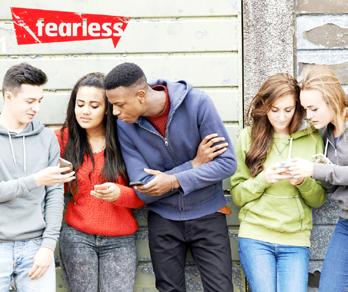
3 minute read
Youngsters at the new karate
from The Knowledge
by Knowle West
By PC Hannah Fletcher
Knife crime continues to hit the headlines, with a number of high profile cases taking place in Bristol recently.
Advertisement
Some of these incidents have involved young people, and it may seem that carrying a knife is normal. Thankfully it’s not – in reality 99 per cent of young people don’t carry knives, and the cases you read about are usually isolated, involving people who know each other. However young people can face pressure from their peers. They may start carrying knives to feel safer or because they hear groups boasting about carrying and feel they need to do the same.
But carrying a knife doesn’t keep you safe. If the people involved in recent incidents hadn’t been carrying a knife - then the situations could now be very different.

Building relationships
We are working hard to break down barriers and build relationships with young people early. In south Bristol, all primary schools now have a designated PCSO who works to build positive relationships with pupils.
The Mini Police at Oasis Connaught and Greenfields continues to provide children with the opportunity to act as role models within their schools, learning how to help others and doing good work in their local community - such as litter picks and tackling speeding by educating drivers with poems.
PCSO Joe Markey and the Filwood team, in conjunction with Bristol City Football Club, have also been getting muddy and testing their own fitness levels, playing football with local children with the aim of breaking down barriers and building trust. Sessions take place every Thursday (term time) from 5-6pm at Connaught primary school Community Hub and are open to young people from any school in the area.
We also take every chance to attend local scout groups, nurseries and youth groups such as Youth Moves. These visits enable our team to educate young people on what the police do, how to stay safe and most importantly to listen to concerns that young people have about their own communities.
We are passionate about supporting our community to bring positive change as well as helping vulnerable people. The work of the new Violence Reduction Unit (VRU) in is an opportunity to not just respond to crime, but to look at the root causes, working with partner agencies and local projects to guide young people and divert them away from crime, towards more positive futures.
We all have a part to play in dealing with this issue - which is why we are asking parents, carers and those that work with young people to start the conversation about knife crime now, offering the facts and support they need to make the right choices.
Talking about knife crime
Talking to a young person about knife crime can be tricky. They may be unwilling to talk about things they’ve seen or heard or feel that you don’t understand.
There are lots of myths around knife crime too, so talking about the realities of knife crime can help bring home how serious it is. Here are some of the key facts you could share: u Most people do not carry knives. u Carrying a knife does not keep you safe. In fact you are more likely to come to serious harm when carrying a knife. u It’s illegal to carry a knife, even if it’s for someone else. u Carrying a knife could mean being arrested, going to court and ending up with a criminal record or even a prison sentence. u There isn’t a ‘safe’ place to stab someone. If a knife punctures an artery anywhere on your body you can bleed to
death within five minutes. u The impact of knife crime goes beyond the victim and the offender. It affects parents, grandparents, brothers, sisters and friends. People’s lives can be ruined forever.
Talking about knife crime is difficult but by doing so you could be saving a life.
Support and advice
If you’d like more support and advice the following organisations and campaigns are a great place to start: Childline (www.childline.org.uk) has information specifically about knife crime and young people can also call the confidential helpline for advice0800 1111 The Mix (www.thmix.org.uk) has some great, straight talking advice, specifically aimed at young people already affected by knife crime
You or your child can report knife crime anonymously at www.fearless. org
The #Knifefree campaign (www.knifefree.co.uk) has some stories from young people who used to carry knives and now don’t. It also has lots of information about talking to and supporting young people.







